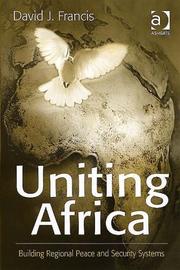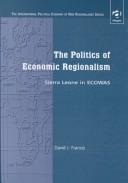| Listing 1 - 10 of 10 |
Sort by
|
Multi
ISBN: 9781842779545 9781842779538 Year: 2008 Publisher: London Zed
Abstract | Keywords | Export | Availability | Bookmark
 Loading...
Loading...Choose an application
- Reference Manager
- EndNote
- RefWorks (Direct export to RefWorks)
Polemology --- Africa --- Peace-building --- Conflict management --- National security --- Security, International --- Collective security --- International security --- International relations --- Disarmament --- International organization --- Peace
Book
ISBN: 9781409422945 9781409422952 9781134763306 9781134763375 9781134763443 9781138271029 Year: 2012 Publisher: Farnham Ashgate
Abstract | Keywords | Export | Availability | Bookmark
 Loading...
Loading...Choose an application
- Reference Manager
- EndNote
- RefWorks (Direct export to RefWorks)
Polemology --- Sierra Leone --- 856.6 Vredesopbouw --- Peace-building --- Postwar reconstruction --- Post-conflict reconstruction --- Reconstruction, Postwar --- Building peace --- Peacebuilding --- Conflict management --- Peace --- Peacekeeping forces --- Economic aspects --- Psychological aspects --- Social aspects
Book
ISBN: 9780415485104 9780203855300 9781136996580 9781136996627 9781136996634 9780415510011 Year: 2010 Publisher: New York London Routledge
Abstract | Keywords | Export | Availability | Bookmark
 Loading...
Loading...Choose an application
- Reference Manager
- EndNote
- RefWorks (Direct export to RefWorks)
USA. AFRICA COMMAND --- USA--MILITARY RELATIONS--AFRICA --- AFRICA--MILITARY RELATIONS--USA --- United States. Africa Command --- United States --- Armed Forces --- Africa --- Terrorism --- Prevention --- Insurgency --- Relations --- Military policy --- Strategic aspects

ISBN: 0754646858 0754646890 Year: 2006 Publisher: Aldershot, England ; Burlington, VT : Ashgate,
Abstract | Keywords | Export | Availability | Bookmark
 Loading...
Loading...Choose an application
- Reference Manager
- EndNote
- RefWorks (Direct export to RefWorks)
National security --- Sécurité régionale --- Organization of African Unity. --- Africa --- Afrique --- Politics and government --- Politique et gouvernement

ISBN: 0754615197 Year: 2001 Publisher: Burlington, VT : Ashgate,
Abstract | Keywords | Export | Availability | Bookmark
 Loading...
Loading...Choose an application
- Reference Manager
- EndNote
- RefWorks (Direct export to RefWorks)
Regionalism --- Economic Community of West African States --- Sierra Leone --- Politics and government
Book
ISBN: 1350221716 1848137494 1282102745 9786612102745 1848133634 Year: 2008 Publisher: London, England : [London, England] : Zed Books, Bloomsbury Publishing,
Abstract | Keywords | Export | Availability | Bookmark
 Loading...
Loading...Choose an application
- Reference Manager
- EndNote
- RefWorks (Direct export to RefWorks)
Bringing together a range of leading academics from Africa and beyond, Peace and Conflict in Africa is an ideal introduction to key themes of conflict resolution, peacebuilding, security and development.
Peace-building --- Conflict management --- National security --- Security, International
Book
ISBN: 9780230339477 Year: 2012 Publisher: Basingstoke Palgrave Macmillan
Abstract | Keywords | Export | Availability | Bookmark
 Loading...
Loading...Choose an application
- Reference Manager
- EndNote
- RefWorks (Direct export to RefWorks)
"This wide-ranging collection offers fresh insights into a critical factor in development and politics on the African continent. It has three primary objectives. First, it critically examines and illustrates the centrality of policing in transition societies in Africa. Secondly, it outlines and assesses the emergence and impact of the diversity of state and non-state policing agencies. Finally, it engages with the nature, scope, and diversity of international interventions for police capacity-building in countries emerging from war as part of security sector reform"--

ISBN: 9780754644521 Year: 2005 Publisher: Aldershot [etc.] Ashgate
Abstract | Keywords | Export | Availability | Bookmark
 Loading...
Loading...Choose an application
- Reference Manager
- EndNote
- RefWorks (Direct export to RefWorks)
Book
ISBN: 3319530534 3319530518 Year: 2017 Publisher: Cham : Springer International Publishing : Imprint: Springer,
Abstract | Keywords | Export | Availability | Bookmark
 Loading...
Loading...Choose an application
- Reference Manager
- EndNote
- RefWorks (Direct export to RefWorks)
This book brings together the most current thinking and research on educator stress and how education systems can support quality teachers and quality education. It adopts an occupational health perspective to examine the problem of educator stress and presents theory-driven intervention strategies to reduce stress load and support educator resilience and healthy school organizations. The book provides an international perspective on key challenges facing educators such as teacher stress, teacher retention, training effective teachers, teacher accountability, cyber-bullying in schools, and developing healthy school systems. Divided into four parts, the book starts out by introducing and defining the problem of educator stress internationally and examining educator stress in the context of school, education system, and education policy factors. Part I includes chapters on educator mental health and well-being, stress-related biological vulnerabilities, the relation of stress to teaching self-efficacy, turnover in charter schools, and the role of culture in educator stress. Part II reviews the main conceptual models that explain educator stress while applying an occupational health framework to education contexts which stresses the role of organizational factors, including work organization and work practices. It ends with a proposal of a dynamic integrative theory of educator stress, which highlights the changing nature of educator stress with time and context. Part III starts with the definition of what constitute healthy school organizations as a backdrop to the following chapters which review the application of occupational health psychology theories and intervention approaches to reducing educator stress, promoting teacher resources and developing healthy school systems. Chapters include interventions at the individual, individual-organizational interface and organizational levels. Part III ends with a chapter addressing cyber-bullying, a new challenge affecting schools and teachers. Part IV discusses the implications for research, practice and policy in education, including teacher training and development. In addition, it presents a review of methodological issues facing researchers on educator stress and identifies future trends for research on this topic, including the use of ecological momentary assessment in educator stress research. The editors’ concluding comments reflect upon the application of an occupational health perspective to advance research, practice and policy directed at reducing stress in educators, and promoting teacher and school well-being.
Psychology. --- Personnel management. --- Occupational medicine. --- Industrial and Organizational Psychology. --- Human Resource Management. --- Occupational Medicine/Industrial Medicine. --- Teachers --- Stress (Psychology) --- Job stress. --- Psychological aspects. --- Industrial medicine --- Medicine, Occupational --- Occupational medicine --- Medicine --- Occupational diseases --- Corporations --- Employment management --- Human resource management --- Human resources management --- Manpower utilization --- Personnel administration --- Management --- Public administration --- Employees --- Employment practices liability insurance --- Supervision of employees --- Behavioral sciences --- Mental philosophy --- Mind --- Science, Mental --- Human biology --- Philosophy --- Soul --- Mental health --- Personnel management --- Emotional stress --- Mental stress --- Psychological stress --- Tension (Psychology) --- Psychology --- Diathesis-stress model (Psychology) --- Life change events --- Type A behavior --- Faculty (Education) --- Instructors --- School teachers --- Schoolteachers --- School employees --- Teacher stress --- Applied psychology. --- Medicine, Industrial. --- Applied psychology --- Psychagogy --- Psychology, Practical --- Social psychotechnics --- Industrial psychology. --- Business psychology --- Industrial psychology --- Psychotechnics --- Industrial engineering --- Psychology, Applied --- Industrial psychologists --- Psychology, Industrial.
Digital
ISBN: 9783319530536 Year: 2017 Publisher: Cham Springer International Publishing
Abstract | Keywords | Export | Availability | Bookmark
 Loading...
Loading...Choose an application
- Reference Manager
- EndNote
- RefWorks (Direct export to RefWorks)
This book brings together the most current thinking and research on educator stress and how education systems can support quality teachers and quality education. It adopts an occupational health perspective to examine the problem of educator stress and presents theory-driven intervention strategies to reduce stress load and support educator resilience and healthy school organizations. The book provides an international perspective on key challenges facing educators such as teacher stress, teacher retention, training effective teachers, teacher accountability, cyber-bullying in schools, and developing healthy school systems. Divided into four parts, the book starts out by introducing and defining the problem of educator stress internationally and examining educator stress in the context of school, education system, and education policy factors. Part I includes chapters on educator mental health and well-being, stress-related biological vulnerabilities, the relation of stress to teaching self-efficacy, turnover in charter schools, and the role of culture in educator stress. Part II reviews the main conceptual models that explain educator stress while applying an occupational health framework to education contexts which stresses the role of organizational factors, including work organization and work practices. It ends with a proposal of a dynamic integrative theory of educator stress, which highlights the changing nature of educator stress with time and context. Part III starts with the definition of what constitute healthy school organizations as a backdrop to the following chapters which review the application of occupational health psychology theories and intervention approaches to reducing educator stress, promoting teacher resources and developing healthy school systems. Chapters include interventions at the individual, individual-organizational interface and organizational levels. Part III ends with a chapter addressing cyber-bullying, a new challenge affecting schools and teachers. Part IV discusses the implications for research, practice and policy in education, including teacher training and development. In addition, it presents a review of methodological issues facing researchers on educator stress and identifies future trends for research on this topic, including the use of ecological momentary assessment in educator stress research. The editors’ concluding comments reflect upon the application of an occupational health perspective to advance research, practice and policy directed at reducing stress in educators, and promoting teacher and school well-being.
Psychology --- Social medicine --- Industrial psychology --- Personnel management --- toegepaste psychologie --- cyberpesten --- coaching --- arbeidsgeneeskunde --- HRM (human resource management) --- organisatiepsychologie
| Listing 1 - 10 of 10 |
Sort by
|

 Search
Search Feedback
Feedback About UniCat
About UniCat  Help
Help News
News